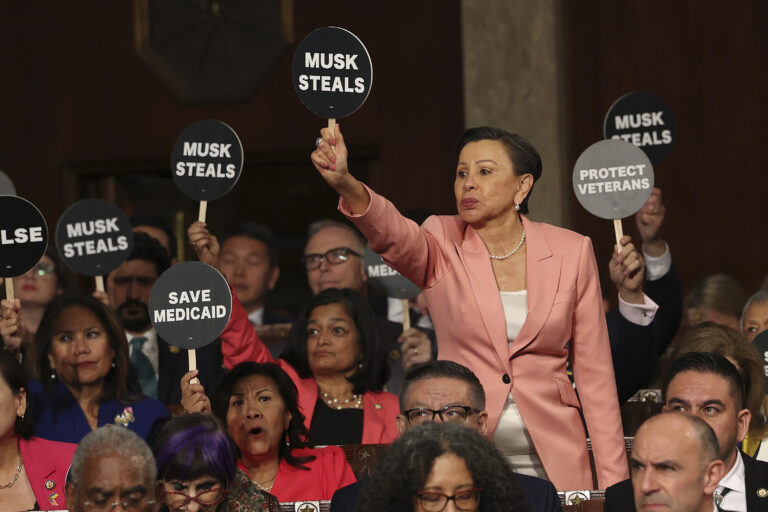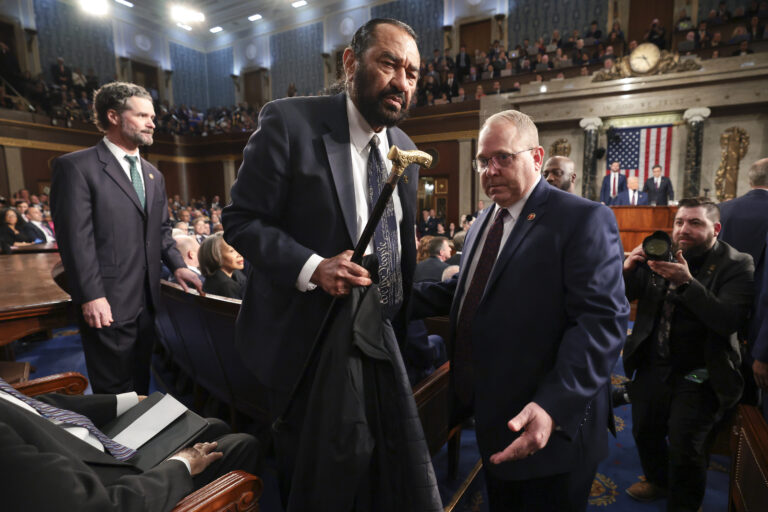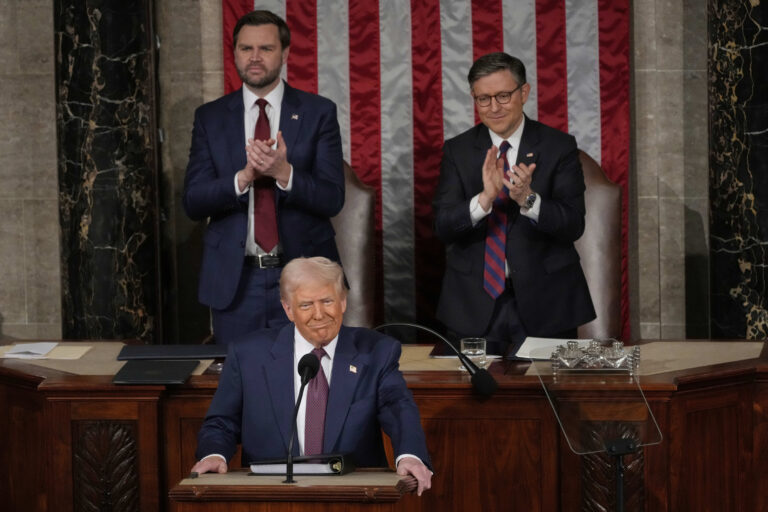The first multistate contest of the 2022 midterm election season unfolds on Tuesday, as Ohio voters pick nominees for governor and the U.S. Senate while Indiana voters consider whether their Legislature should become even more conservative.
The races, particularly in Ohio, could provide a fresh window into former President Donald Trump’s sway among the party faithful. He has been especially involved in Ohio’s Senate primary, which has been marred by Republican divisions, along with campaigns for the U.S. House and secretary of state.
For Democrats, a potential threat to incumbent U.S. Rep. Shontel Brown in Cleveland is of keen interest. Brown is locked in a rematch against progressive challenger Nina Turner, a former state senator and surrogate for Vermont Sen. Bernie Sanders’ presidential campaigns. Turner is trying again after losing to Brown in last year’s special election.
Voting in Ohio comes against the backdrop of a chaotic and still unresolved redistricting battle.
What to watch as the Ohio and Indiana primaries unfold:
WHO WILL SURVIVE OHIO’S NASTY SENATE PRIMARY?
Seven candidates are on the ballot in Tuesday’s Republican faceoff for the coveted open U.S. Senate seat of retiring Republican Rob Portman. They are Trump-endorsed “Hillbilly Elegy” author JD Vance, former Ohio Treasurer Josh Mandel, Cleveland investment banker Mike Gibbons, former Ohio Republican Chair Jane Timken, state Sen. Matt Dolan, whose family owns the Cleveland Guardians baseball team, and entrepreneurs Mark Pukita and Neil Patel.
The campaign has featured months of jockeying among top contenders for Trump’s endorsement, more than $65 million in TV and radio spending, dozens of debates and candidate forums, and one highly publicized physical confrontation between two candidates.
As Vance rides high on the Trump endorsement, other candidates who campaigned on their loyalty to the former president are hoping that heavy ad spending or a strong ground game can help them win. Dolan is the only candidate who ran as a Portman-like centrist, but Timken landed Portman’s endorsement.
Whoever prevails will face the winner of a three-way Democratic primary between 10-term U.S. Rep. Tim Ryan, former consumer protection attorney Morgan Harper and Columbus activist and tech exec Traci Johnson.
IS A TRUMP ENDORSEMENT A SLAM-DUNK IN OHIO?
Trump twice won Ohio by more than 8 percentage points, so many viewed getting his nod in the Senate race as critical to winning the crowded Senate primary. Instead, when he finally chose Vance, it divided the state.
That’s because Vance opponents, including Mandel, Gibbons and their allies, had aired months of ads highlighting Vance’s past anti-Trump statements. Some tea party Republicans protested an April 23 Trump rally featuring Vance, and one conservative group, Ohio Value Voters, urged its supporters to boycott — or boo Vance when he walked on stage. The deep-pocketed Club for Growth, a conservative group backing Mandel, has taken to TV with ads directly attacking Trump for his choice.
Trump also has backed candidates in two Republican congressional primaries: Max Miller, his former White House and campaign aide, in the sprawling new 7th District in northeast Ohio, and Madison Gesiotto Gilbert in the Akron-area 13th District. He also is backing Secretary of State Frank LaRose in his primary against former state Rep. John Adams, a conservative Trump supporter.
WILL A WOMAN BREAK THROUGH IN OHIO’S GUBERNATORIAL RACE?
Democrat Nan Whaley is seeking to be the first woman in Ohio to get a major party’s nomination for governor. The former Dayton mayor is locked in a tight race with ex-Cincinnati Mayor John Cranley, who is endorsed by feminist icon Gloria Steinem.
They see eye-to-eye on most major issues — guns, abortion rights, social justice — but Whaley has repeatedly pointed out that Cranley only recently said he was pro-choice. She also has the backing of the state’s top Democrat, U.S. Sen. Sherrod Brown.
Neither candidate is a household name across Ohio. Both have struggled to draw attention as much of the state is focused on the contentious U.S. Senate race and ongoing redistricting fight.
The big question for first-term Republican Gov. Mike DeWine is just how many conservative voters will punish him for pushing aggressive mandates and shutdowns during the pandemic.
DeWine is widely known from a 40-year career in Ohio politics and in a solid position to win the GOP’s nomination for another four-year term. His two main challengers have tapped into the anger over the governor’s COVID-19 policies, but they’re likely to split those far-right voters.
DeWine isn’t taking any chances, pouring millions into advertising during the weeks leading into the primary. The concern will be whether those same conservative voters who were furious with DeWine will come back to him in November.
WILL CONFUSION OVER OHIO’S PRIMARY CALENDAR AFFECT RESULTS?
A protracted battle over Ohio’s congressional and legislative maps has played havoc with the state’s 2022 election calendar. For a long time, it looked like the May 3 primary wouldn’t go forward amid all the legal wrangling. Then suddenly it did.
Voter advocates, campaigns and political parties have stepped up efforts to get the word out as participation in early voting showed a 40% decline from four years ago.
Tuesday’s ballots will not list state legislative races, which are expected to be decided in a second primary later this year. The Ohio Redistricting Commission faces a deadline next week to try for a fifth time to draw district lines that don’t represent a partisan gerrymander and can meet constitutional muster. If the panel fails, a federal court has said it will force an Aug. 2 primary using one of the previously invalidated maps.
Congressional races have gone forward using a map that has also been invalidated by the Ohio Supreme Court. Ongoing litigation could result in a new map before 2024 elections.
IS INDIANA’S LEGISLATURE CONSERVATIVE ENOUGH?
More than a dozen Indiana House members are trying to hold off Republican primary challengers who argue that the GOP-dominated Legislature hasn’t been aggressive enough on issues from attempting to ban abortion to overturning COVID-19 restrictions that were ordered by the state’s Republican governor.
Those challengers say they are tapping into frustration among conservative voters and want to push the Legislature further to the right in a state where Republicans control all statewide offices and have had legislative supermajorities for the past decade.
Whether the challengers can defeat incumbents backed by Republican leaders’ multimillion-dollar campaign fund should be answered in Tuesday’s primary.
Republican legislative leaders argue the “no compromise” stances adopted by many challengers aren’t practical and tout the state’s low taxes and unemployment and broad private school voucher program among its conservative successes.
Challengers like Brittany Carroll, a family law attorney running for a central Indiana seat, maintain Indiana lawmakers should be aggressively pushing issues such as the Texas ban on abortions after roughly six weeks of pregnancy.
“Indiana could be leading in terms of liberty, like Florida, like Texas,” Carroll said.
(AP)











